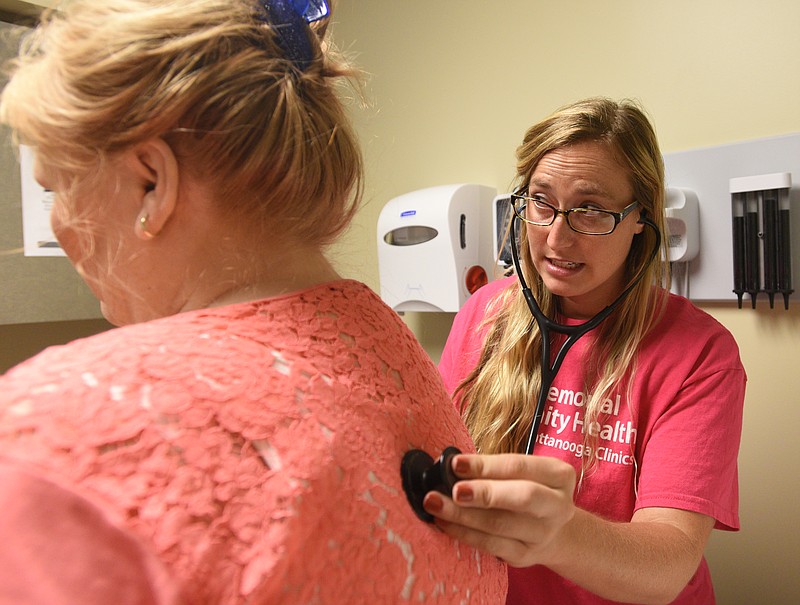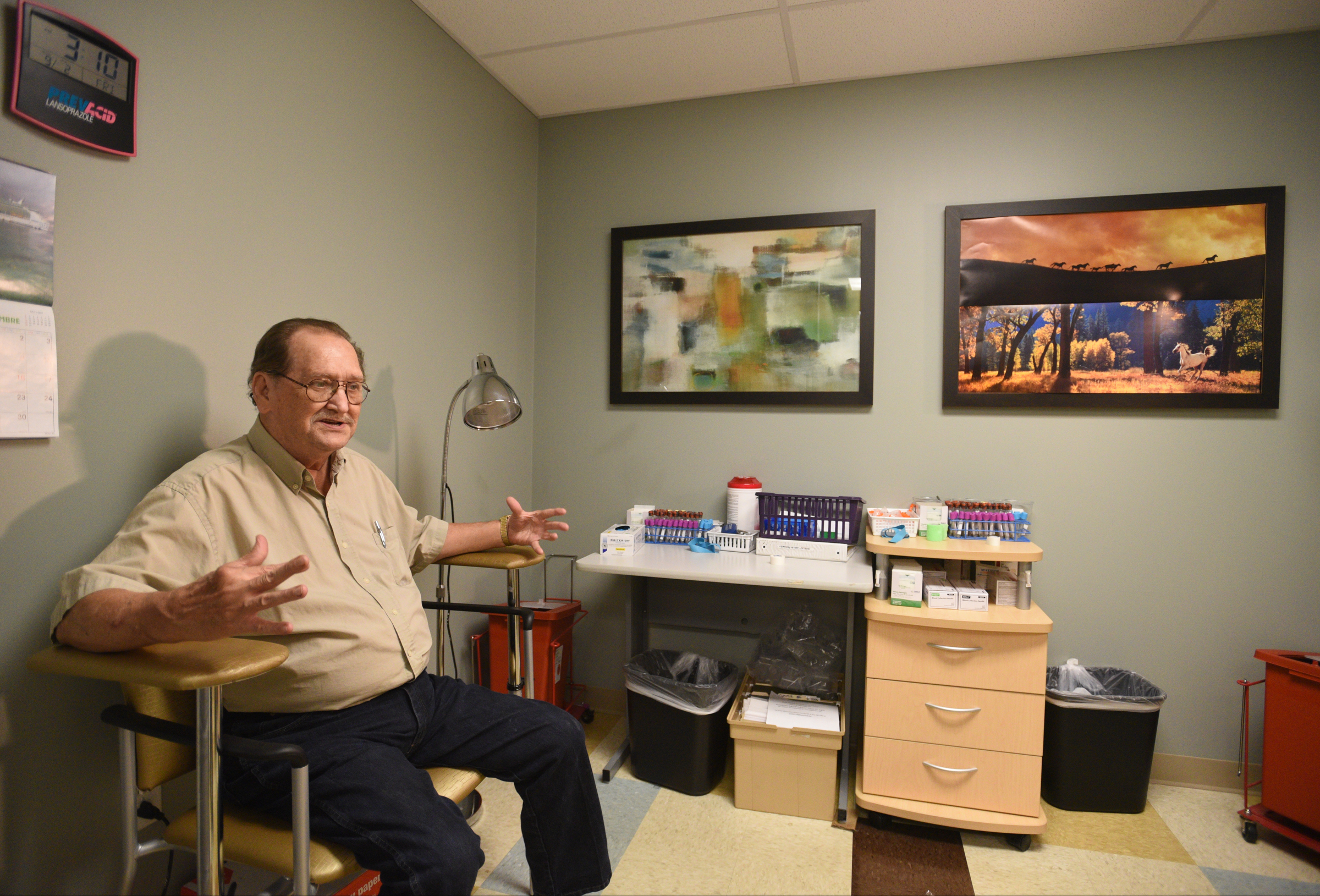Terry Dudley has friends here.
He spends most of his days at home watching television, alone with his dog, but when the 67-year-old Red Bank resident walks into CHI Memorial's Community Health Center in Hixson on this Friday afternoon, everyone smiles and says hello.
"They're great, they are like family," Dudley said. "The only thing I don't do is eat with them."
Doctors talk about the need for all patients to have what they call a "medical home" for their basic health care needs, and that's truly what the Hixson clinic has been for Dudley. He's been coming here for 15 years, long before the clinic moved from its location on the North Shore up to Hixson Pike.
The clinic's staff has treated him for diabetes, helped with his depression, and made sure he is taking his medications for his chronic back pain.
"I worry when something comes up with me and I don't feel right," he said. "I want to get an appointment to find out. It usually end up being nothing, but still "
CHI Memorial's Hixson clinic is one of nearly a dozen community-based health centers that provide medical services to tens of thousands of metro Chattanooga residents, most of them people who can't afford health insurance. While the city's three major hospitals get most of the attention, it is these neighborhood clinics that take care of the most vulnerable residents.
"We are the safety net," said Angel Moore, executive director of the two health centers affiliated with Erlanger, on Dodson Avenue and on 37th Street near Alton Park.
The net is needed because of an unintended gap in the Affordable Care Act, better known as Obamacare.
When the Affordable Care Act was passed, the plan was for all states to expand their Medicaid programs to cover everyone below a certain income level. Only pregnant women, children and the disabled qualify for Medicaid, known as TennCare, in Tennessee.
But the U.S. Supreme Court knocked a huge hole in the plan by striking down that part of the law that required the states to expand Medicaid. That left thousands of people who aren't covered at work, make too little money to be able to pay for premiums on the health insurance exchanges, and don't earn enough to qualify for the federal subsidies for the exchanges.
"We see the working poor, people who are under-insured or with no insurance at all," said Errika Hill, a social worker at the Hixson clinic. "People working in restaurants, or construction, truck drivers, or people who have been laid off from work."
Other clinics are more specialized. Two of the five managed by the Chattanooga-Hamilton County Health Department serve pregnant women and children, while Clinica Medicos focuses on the Hispanic community. The health department also manages the Homeless Health Care Center, Chattanooga Cares specializes in people with HIV, LifeSpring offers pediatric care, and Cherokee Health Systems accepts patients who need primary care or have mental health issues.
Many of the clinics will accept anyone, even those with private health insurance. About 15 percent of the 14,000 patients seen annually at Memorial's two clinics have health insurance, Hill said.
But most are receiving either TennCare or Medicare or have no insurance at all. Moore said about 70 percent of the patients at her two clinics are uninsured, while Hill said 40 percent of the people who visit Memorial's Hixson or Grove Street clinics are uninsured and another 45 percent are on Medicaid or Medicare.
While the services provided at each clinic vary slightly, those offered in Hixson are typical. Under the direction of a medical director, who is a doctor, nurse practitioners and physicians assistants provide primary care for teens and adults including Pap tests, pelvic exams, physicals, management of chronic diseases, X-rays, and patient education and counseling. There is a class to help people stop smoking, and plans for a nutrition class as well.
Medicare or Medicaid patients often need help paying for prescriptions, Hill said, and the clinic has specialists who help them qualify for aid.
A major portion of staff time is spent explaining how the health care system works, and checking to see if patients have signed up for all of the benefits available to them.
In Hixson, everyone, no matter what their income, is asked for a co-payment of $10 for every visit. Not everyone pays, but those who do seem to be more connected to their care, said Hill, a Central High School and University of Tennessee at Knoxville graduate with an master's in business administration from Southern Adventist.
"I think they have more ownership when they pay," she said.
Erlanger's Moore said she learned the value of a community health center firsthand. She was in law school at Michigan State University when she passed out while standing in line at the cash register at a local K-Mart, she said. She had no health insurance and ended up at a local community health center, where she was diagnosed with severe anemia.
That experience helps her to connect with the patients at her clinics.
"They have life issues they are dealing with," Moore said. "They may have socioeconomic challenges, literacy challenges, transportation barriers."
Moore, a Savannah, Ga., native, earned her law degree and went on to use it to develop health care programs across the state of Michigan before accepting Erlanger's offer in April to come to Chattanooga. One of the lessons she learned was the need for comprehensive programs under one roof.
At the Dodson Avenue clinic, for example, besides primary care, patients can get pediatric care and women's services. There is a dental clinic and a pharmacy, and a WIC (food for women and infant children) office, plus translation facilities, and help obtaining transportation and enrolling into health plans.
Managers at all of the clinics say they realize their patients often come to them with medical problems that are compounded by social or economic issues.
Nowhere is that more apparent than for Karen Guinn, the director of the Homeless Health Care Center on 11th Street, which served 3,700 people last year.
"Literacy is a huge issue," she said. Most of the clinic's printed materials are written at a fifth-grade level, and counselors spend a lot of time giving oral instructions.
"We wouldn't just hand someone a piece of paper thinking they would read and understand it," Guinn said.
Keeping in touch with patients is another challenge. Staffers ask patients for contact information, often for a family member.
"We ask where they are staying so we know the general area where they are," Guinn said. "Sometimes our outreach team can send someone out if we need to reach them."
The Chattanooga Community Kitchen on 11th Street, across the street from the homeless clinic, also allows homeless people to set up mailboxes.
Some homeless people have access to government-issued cellphones that allow them to make a limited number of calls and text messages, Guinn said.
One goal is to ensure that everyone who comes in has identification.
"Homeless people need to have a photo ID, a Social Security card, and a driver's license," she said, "in order to request many types of services or even to be upwardly mobile in applying for jobs - they have to have those kinds of documents."
Medicines are always challenging, she said.
"Let's say they need to follow a specific regimen every day that requires some type of routine or access to water or access to a bathroom - that is challenging to a homeless individual," Guinn said. "For a diabetic who needs insulin, it is very difficult to keep that secure and keep it at the right temperature in the field."
A first goal is to stabilize the situation. For families, that means providing them with a fixed place to stay.
"Can we assist them to get stable so their children can be in school," she said, "so they can be in a routine, and not have to sleep in a car - somewhere they can stay in a bed."
Alcohol, drugs and mental health issues are also regular problems. The clinic has a psychologist on staff, and refers many cases to the Joe Johnson Mental Health Center, which has an office in the Homeless Health Care Center.
"Having that connection and collaboration here makes a patient more open and is conducive to them thinking about that treatment and making that decision," Guinn said.
She knows the clinic staff can't force any course of care on a patient.
"If they're at the place where they would like to make that decision to address their alcohol or drug issues, we hope they will make that decision," she said. "We encourage that if we know it is contributing to their homeless situation."
The clinic has two substance abuse counselors and offers an intensive 30-day program. But Guinn knows that even if the homeless patient completes the course and becomes drug and alcohol free, they need additional help.
"They will need a resume, they will need to know how to fill out a job application, they will need clothing, and to know how to dress," she said.
While treating homeless patients can be frustrating, there are also rewards, Guinn said.
"When we see someone who has been able to obtain their own housing and is stabilized and has taken steps along the way that have gotten them there, and we have been able to provide services, that is what warms our team's heart," she said.
Contact staff writer Steve Johnson at 423-757-6673, sjohnson@timesfreepress.com, on Twitter @stevejohnsonTFP, and on Facebook, www.facebook.com/noogahealth.

